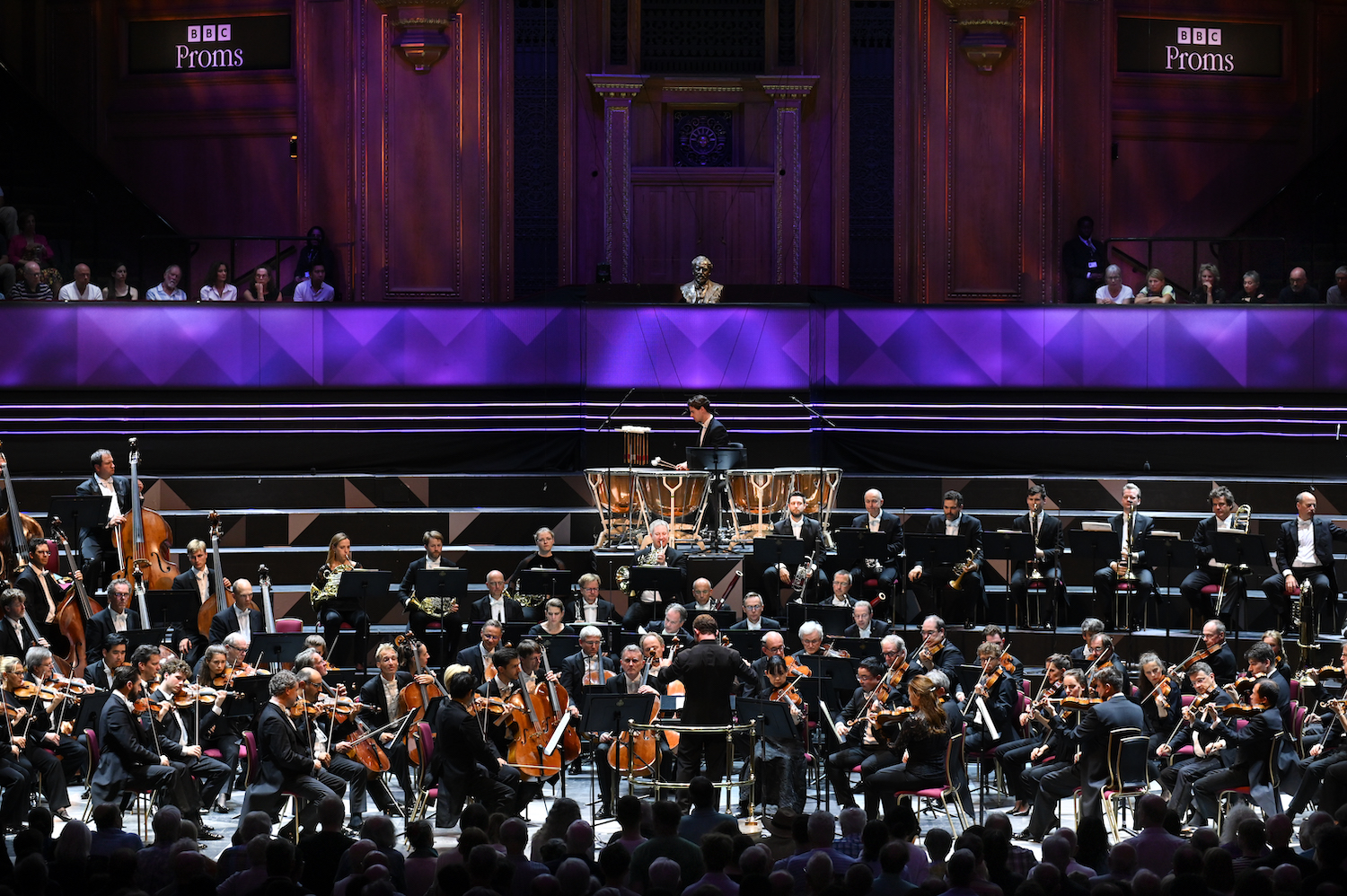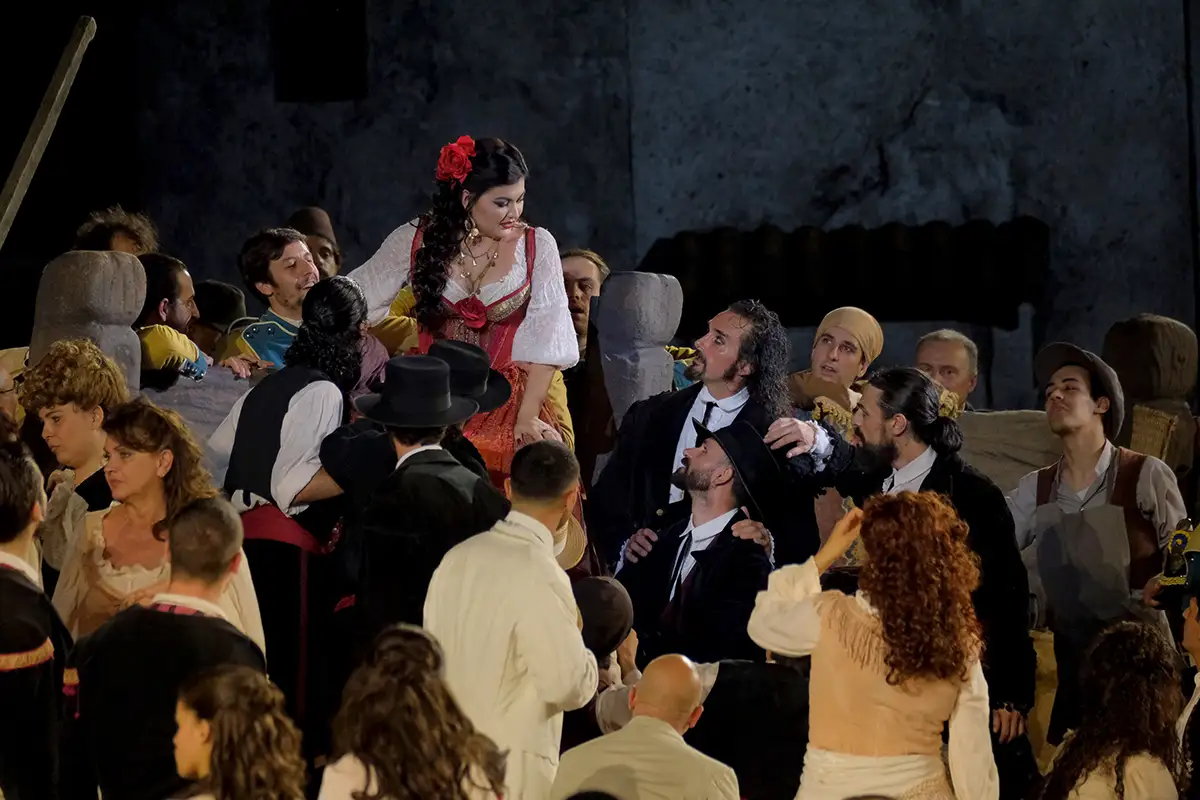
¨Franco Zeffirelli spoke with the animals. He spoke with the geese and was convinced he’d trained them. Only later did he learn that they actually understood the music – and knew exactly when to make their entrance¨. So says Cecilia Gasdia, General Manager of the Fondazione Arena di Verona, which runs the world’s largest opera festival.
This year marks the 150th anniversary of the premiere of Carmen in Paris, and three months later, the death of its composer, Georges Bizet. In its 102nd season the Arena di Verona Opera Festival commemorates Bizet with the 15th revival of Zeffirelli’s spectacular Carmen. It was created for the Roman amphitheatre in 1995, but the flamboyant director continued tweaking the staging and adjusting overlong set changes until his death in 2019.
The entrance of the goose and gander is long gone, but to celebrate the 30th anniversary of Zeffirelli’s production, three clueless journalists – including myself – are let loose on stage, for one night only.
Normally an opera critic’s job is fairly cushy. The pay is rubbish, but you get to visit classy locations and ornately decorated opera houses. The musical offerings are usually pretty good, sometimes top class. But the Arena’s management clearly wants music journalists to step out of their comfort zones and experience the sweaty business of performing an opera in the scorching summer heat.
I couldn’t resist the lure of treading the boards and signed up. At the same time I set myself a challenge: could I be an extra on stage while also reviewing the show?
It’s the evening before the opening night and I report to the ancient monument in Verona for the dress rehearsal. Two German journalists join me at Gate 17 – once a Roman vomitorium ( a crowd exit, not a place to vomit). While waiting to be collected, the sheer scale of this production starts to sink in. Outside gates 18 and 19, donkeys, horses, a horse-drawn cart, colourful props, and mountains of scenery required for set changes are queued up. Inside the arena, every backstage nook and cranny is filled to maximum capacity, yet the ancient vaulted passageways allow the cast and crew to navigate with ease.
We’re about to learn which characters we’ll inhabit and get fitted for our costumes. I secretly hope to be dressed to kill in a sparkly matador de toros costume. I’d look good in that. The three wardrobe ladies looking after us are lovely, but no, I can’t have a toreador costume – there’s a serious risk I might upstage Escamillo. Instead I’m kitted out in stereotypical ‘gypsy’ garb: a loose white shirt , vest, thick jacket, sash tied at the waist, leather boots, headscarf, and hat. I’ll swelter in the heat.
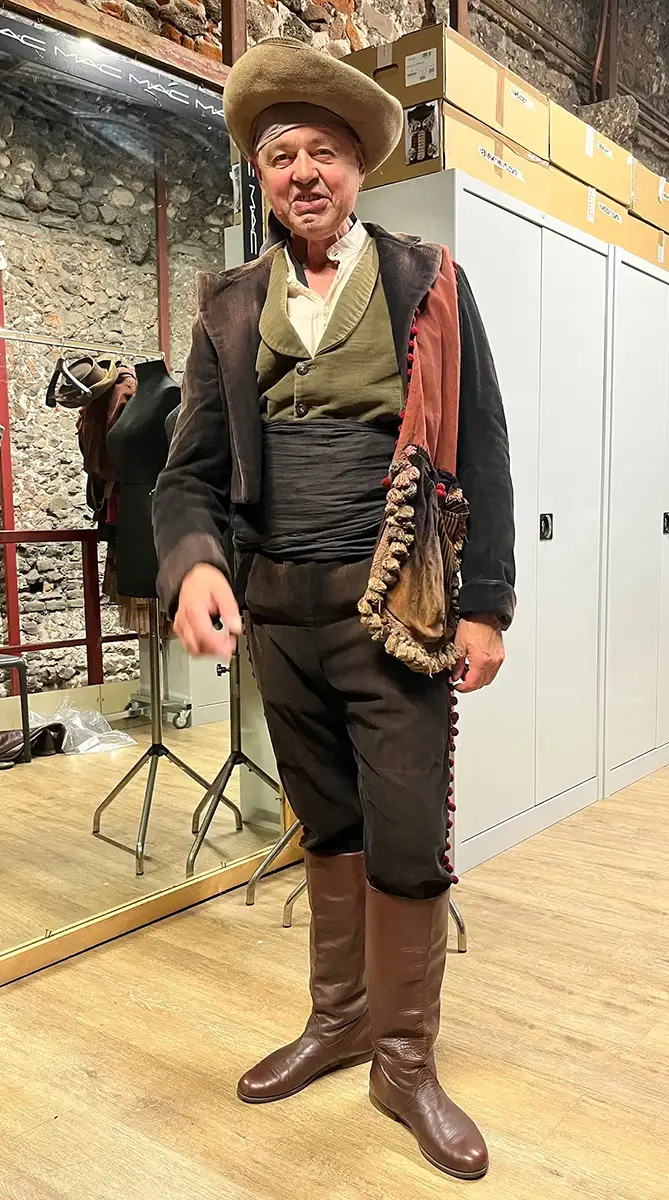
Despite my eagerness, I’m not required for the dress rehearsal, but I’m welcome to watch.
The next day is our meeting with Cecilia Gasdia, who sang in many Zeffirelli productions. ¨He was a perfectionist and insisted on two months of rehearsal¨, she says. But will the festival in the future offer the public an immersive experience, like the one I’m going to have?
¨Many people would love to¨, she smiles, noting that in the 1970s the General Manager occasionally went on stage in costume – and sometimes brought guests with him.
But Arena productions can involve hundreds of cast members, complex scene changes and even live animals. Without proper rehearsals, it wouldn’t be safe to let the public join the action. ¨But who knows? Maybe in the future¨, Gasdia adds.
We get no rehearsal time. Instead, each journalist will be assigned a mentor. Two hours before curtain, revival-director Yamal Das Irmich gives us the shortest acting class in history: don’t stand too close to colleagues; listen to your mentor; stick to your side of the (enormous) stage. And if we’re at a loss for what to do, Yamal shows us how to lean against a (sturdy) piece of scenery with attitude. 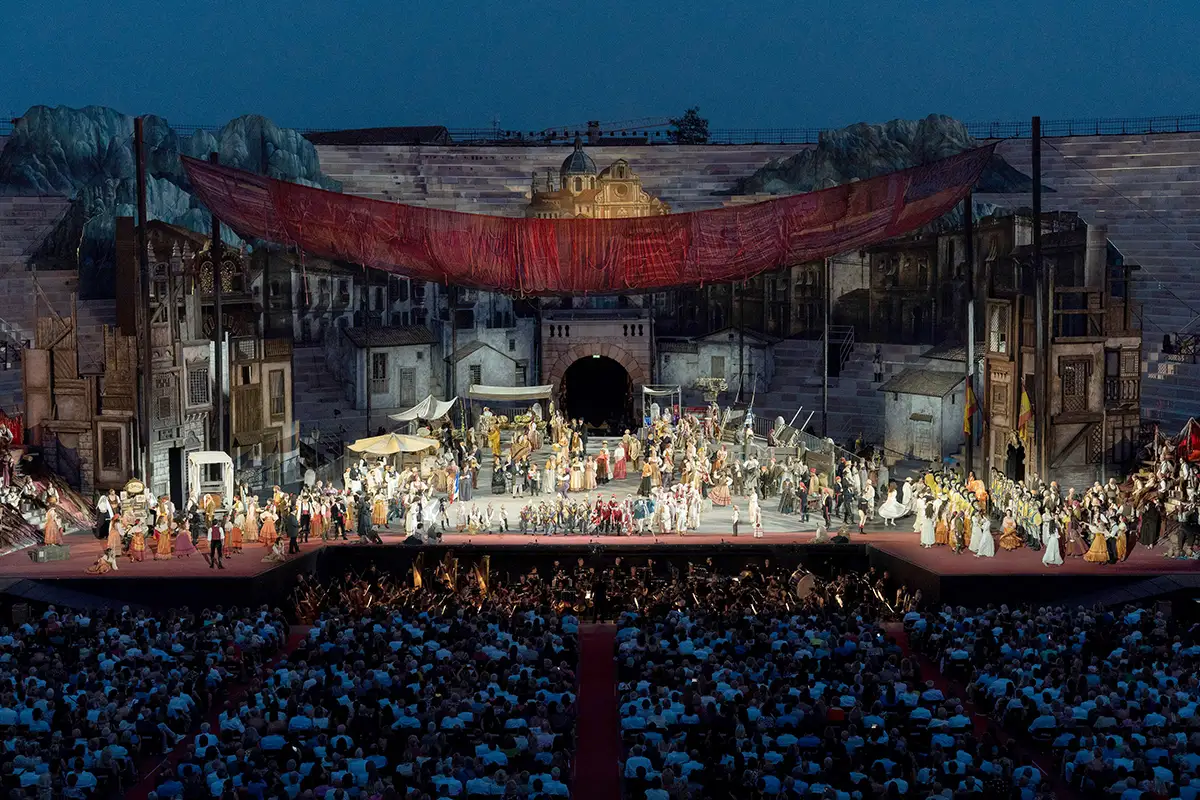
Backstage I meet my mentor, Martina, who’s not even half my age – and all the more striking for it. Dressed in her gypsy costume, she looks straight out of Central Casting. Her English is fluent, so nothing gets lost in translation. For culturally inclined Veronese youth, working as an extra is practically a rite of passage. You have to audition, and it doesn’t hurt to be photogenic.
At 9.15 PM the temperature still hovers above 30°C as 480 singers, dancers, acrobats and extras join me on stage, facing a near-capacity crowd of 13,000. Martina hooks my arm and guides me diligently during Act I, feeding me discreet cues. We sit close for a while, then stroll through a bustling marketplace. I offer her plastic flowers and swig copious amounts of air from a plastic wine bottle. The music soon electrifies Martina and she abandons me to flirt with every virile man in sight, until she’s swept into a full-blown scuffle.
I’m completely distracted by the auxiliary goings-on – marching dragoons, cigarette girls, beggars, sprightly youths– and struggle to follow the action involving the soloists.
Act II finds us entering Lillas Pastia’s tavern crawling like snakes (don’t ask). I get up and do my best drunken stagger across the stage to the opposite side, where I strike a few stock poses from the beginner’s guide to upstaging. From my vantage point I revel in Escamillo’s Couplets du Toréador, delivered with dark aplomb and swagger by Erwin Schrott. When the tavern closes and Carmen is joined by the smugglers, Martina whispers that it’s time to leave. It’s the end of my shift. I thank my mentor, peel off my costume and wipe off the sweat.
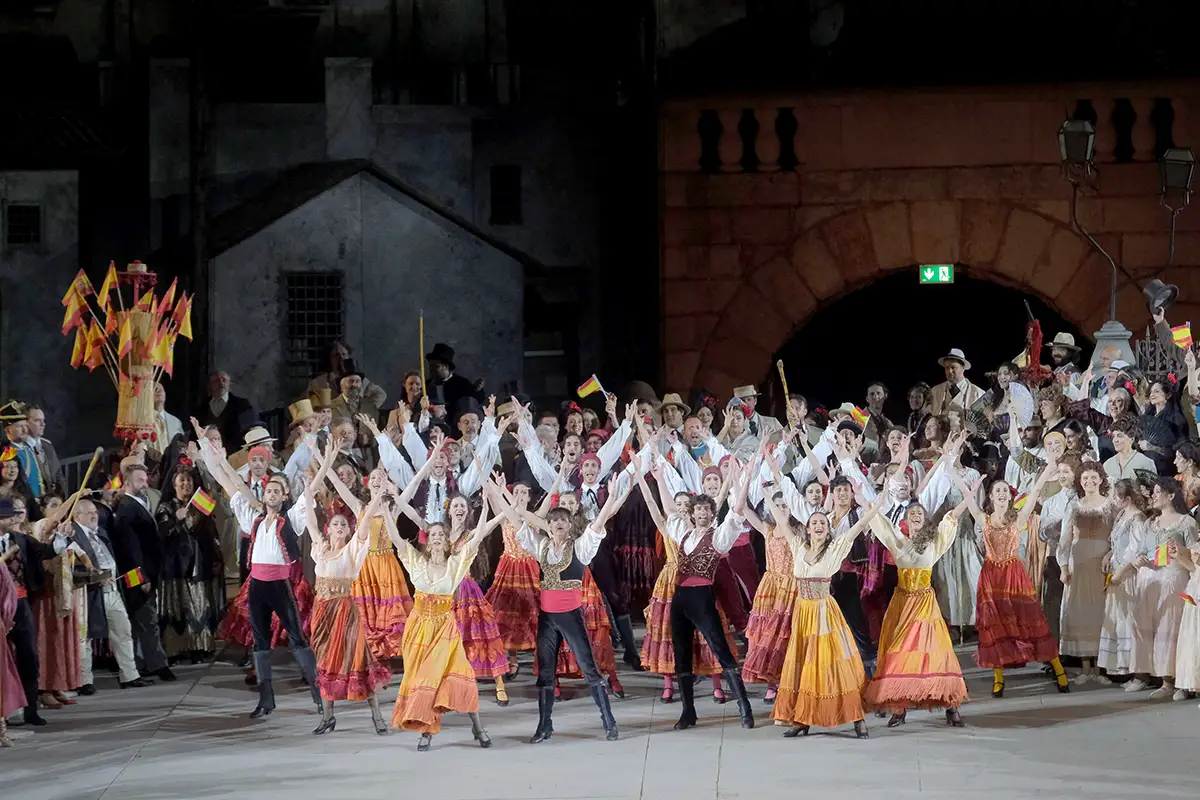
I join my wife in the arena during the interval. She spotted me, and Martina’s head on my shoulder. It takes a little while to switch back into music critic mode. But before long Aigul Akhmetshina’s fierce yet sensual Carmen has me on the edge of my seat. With her velvety legato, astonishing agility and dazzling top range, it’s not surprising she’s become the go-to Carmen for major opera houses today.
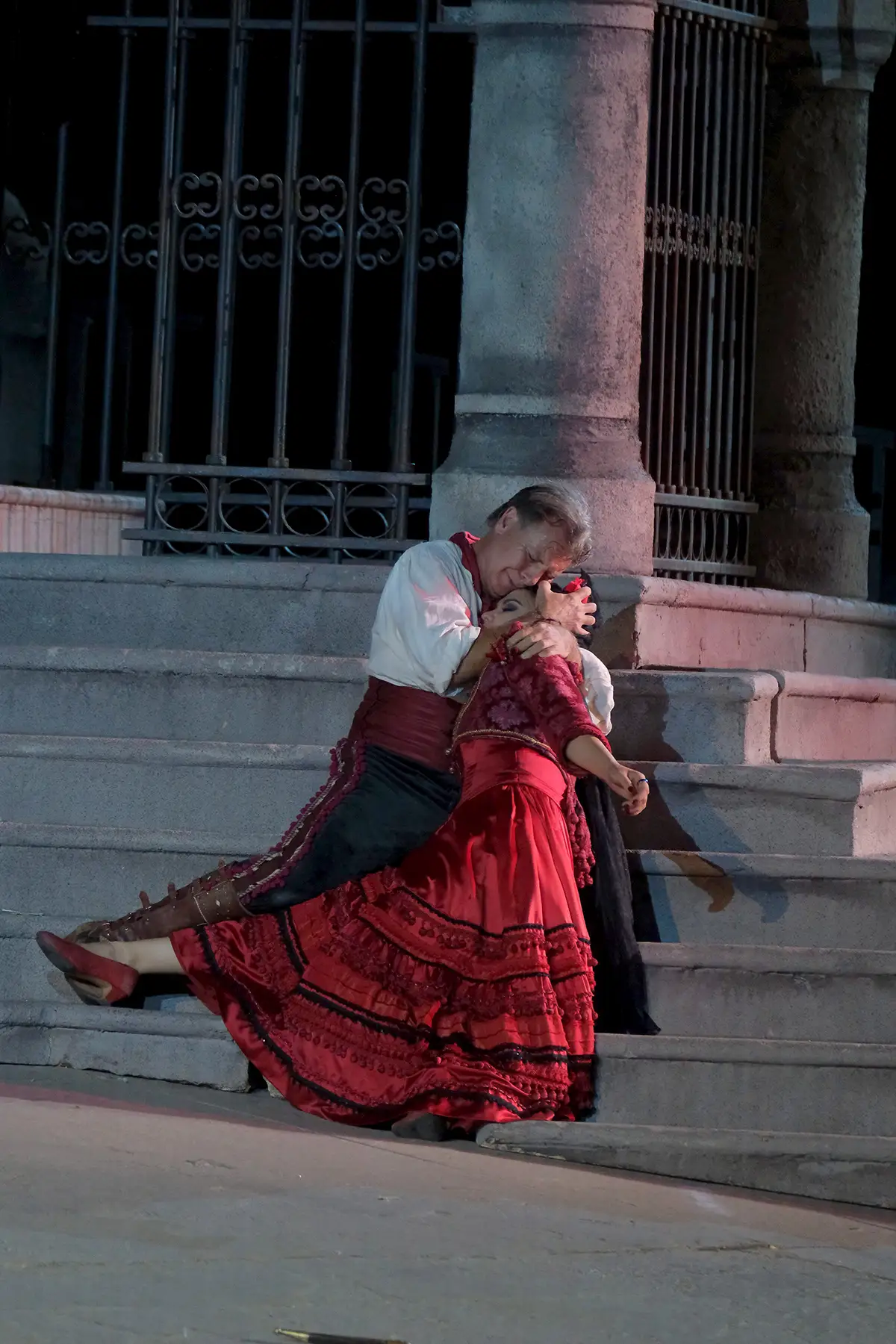
Roberto Alagna’s Don José occasionally sounds strained, but his voice remains in remarkably good shape. This is an aging Don José – less a criminal than a tragic victim, just like the fiery woman he can’t control. Aleksandra Kurzak delivers one of the standout performances with her sotto voce, pinpoint rendition of Micaela’s aria Je dis que rien ne m’épouvante. Another highlight is a flamenco dance-off (without music!) between two rival gypsy troupes, during a lengthy set change. Verona’s massive arena will always challenge the orchestral balance, but conductor Francesco Ivan Ciampa has a handle on it.
Will this be my first and last assignment as an embedded opera correspondent? Next time I will demand a singing role.
Alright, Mr Zeffirelli, I’m ready for my close-up.
THIS POST ORIGINALLY APPEARED ON LIMELIGHT MAGAZINE’S WEBSITE (and was read by millions of Australians)
Upcoming shows and tickets for Carmen at Arena di Verona can be found here

